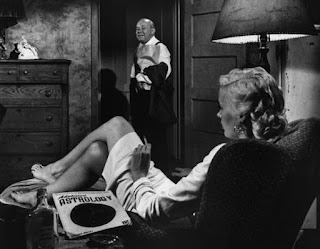(1953)
Directed by Russell Rouse
Written by Clarence Greene and Richard Rouse
Starring Beverly Michaels, Richard Egan, Percy Helton, Evelyn Scott
IMDB Entry
Film Noir is often difficult to define, but a common element involves a woman who entices a man into crime. Wicked Woman is clear in that milieu, as the title indicates.
Billie Nash (Beverly Michaels) shows up in a small town and gets a job as a waitress in a café run by Matt Bannister (Richard Egan) and his wife Dora (Evelyn Scott). Billie makes a play for Matt, who is frustrated at the way his marriage is going, especially since Dora has a drinking problem. She convinces him to sell the place and run off with her to Mexico, but there is a problem, of course: Dora owns half the café and certainly would not agree to sell, especially under these circumstances. Meanwhile, Billie keeps stringing along her neighbor Charlie (Percy Helton), using him when useful and ignoring his obvious desire for her.
Beverly Michaels portrays Billie as a schemer who has no compunction about manipulating men. She senses weakness in Matt and draws him into her influence. At the same time, she is willing to be charming to Charlie, a lonely and unattractive man, so he’ll help her out. Eventually, he learns he’s being used.
Michaels had a relatively short career in B movies and as a cheesecake model. She married this film’s director, but had few credits, despite the strength of the performance here.
Percy Helton is especially good. There is a pathos to him, as he doesn’t understand he’s being used. The actor did a lot of TV in the 50s and 60s, as a short, dumpy man with a squeaky voice. This was purportedly his favorite role.
The odd thing is that the movie doesn’t have the courage of its convictions. Film noir usually ends up with the man and the woman he obsesses over destroyed. There may have been censorship problems – Matt is married and wants to leave his wife, something that the Hays Office would not countenance. It probably was what they wanted to do, but rewrote it so that he and his marriage survive – barely.
Overall, though, it's an interesting foray into the genre.


1 comment:
Enjoyed the entry, but when you wrote
something that the Hays Office would not continence
you surely meant "countenance", not "continence". Auto-correction, perhaps?
Post a Comment